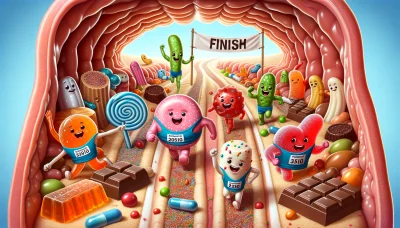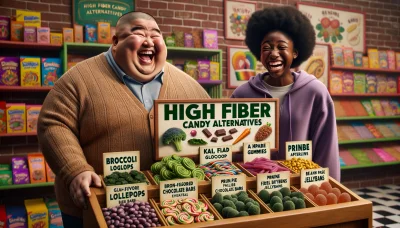Cancer-Fighting Antioxidant Rich Chocolates Quiz
Test Your Knowledge
Question of
Understanding Antioxidants in Chocolate
The Role of Antioxidants in Cancer Prevention
When I first heard about antioxidants, I imagined them as these tiny, valiant warriors battling it out against the unseen forces that threaten our bodies. It's not far from the truth, really. Antioxidants are compounds that protect our cells from damage caused by free radicalsthose unstable molecules that can lead to chronic diseases such as cancer. The thought of chocolate being a delicious ally in this fight is nothing short of a revelation; it's like finding out your best friend is also a superhero.
Savoring a piece of rich, dark chocolate, I can almost feel the antioxidants coursing through me, safeguarding each cell with every melt-in-your-mouth moment. The connection between these protective compounds and cancer prevention is a dance of science and indulgence. As research suggests, antioxidants may inhibit the growth of cancer cells and reduce the risk of certain types of cancer. It's empowering to think that such pleasure can align with my body's well-being.
How Antioxidants Neutralize Free Radicals
Imagine a bustling city street where free radicals are like reckless drivers causing havocantioxidants are the traffic lights and crosswalks restoring order to this molecular metropolis. These free radicals, if left unchecked, can cause oxidative stress leading to cell damage. This is where antioxidants step in; they neutralize these radicals, effectively preventing them from causing harm.
I used to think that eating chocolates was just about treating myself after a long day, but knowing now that each square offers protection against these microscopic threats elevates my snack time into an act of self-care. It's like wearing an invisible shield while delighting in the symphony of flavors that dance across my tongue.
The Impact of Antioxidants on Cell Health
Cells are the building blocks of our bodies, and keeping them healthy is like maintaining a fortress against illness. Antioxidants contribute to this by ensuring our cells remain robust and resilient. They're akin to the maintenance crew that keeps everything running smoothly amidst the daily wear and tear.
Biting into a piece of antioxidant-rich chocolate has become more than just a sensory pleasureit's become an intimate ritual for cellular nourishment. Each bite feels like a personal toast to health; a silent acknowledgment of the complex beauty hidden within simple acts.
Types of Antioxidants Found in Chocolate
Flavanols and Their Benefits
Flavanols are one group of antioxidants found abundantly in cocoa beans, which give chocolate its cancer-fighting potential. They're like the elite special forces within the antioxidant army, known for their heart-healthy benefits and their role in improving blood flow to the brain and skin.
On days when life feels overwhelming, knowing that my choice of comfort food contains flavanolsa champion for my cognitive functiongives me one more reason to smile as I break off another piece. The rich taste carries not only satisfaction but also the promise of vitality.
Polyphenols and Their Effectiveness
Alongside flavanols in this delicious concoction are polyphenols, another type of antioxidant with significant health properties. They're like guardians at the gate when it comes to protecting our cells from potential invaders or internal threats.
As I let that chunk of dark chocolate dissolve slowly on my tongue, it's not just an explosion of flavorit's an infusion of polyphenols working tirelessly behind the scenes. Their effectiveness extends beyond mere protection; they also have anti-inflammatory properties that contribute to overall wellness.
- Catechins: Known for their disease-fighting abilities.
- Epicatechins: These work hand-in-hand with catechins to bolster cell defense.
- Proanthocyanidins: They specialize in cardiovascular protection.
The Health Benefits of Dark Chocolate
There's something about dark chocolate that speaks to the soul, isn't there? It's like a whisper of indulgence that not only delights the senses but also brings with it a bouquet of health benefits. I remember the first time I became aware of the fact that my guilty pleasure had more to it than just satisfying my sweet tooth. The thought that I was actually doing something good for my body while savoring each rich, velvety piece was nothing short of revelatory.
As I dove deeper into this delectable world, I learned that dark chocolate is not just a treat, but a complex food with intricate flavors and an impressive array of health-enhancing properties. It became clear that this wasn't just about indulgence; it was about an empowering choice for my well-being. Imagine thata world where pleasure and health aren't at odds but are instead beautifully intertwined!
And so, with each bite, as the complex flavors dance on my tongue, I can't help but feel a sense of joy and gratitude. Not only am I delighting in one of life's simple pleasures, but I'm also engaging in an act of self-care. It's a reminder that sometimes, the path to happiness is paved with chocolateand if it's dark chocolate, even better.
Nutritional Profile of Dark Chocolate
The journey into the heart of dark chocolate begins with understanding its nutritional profile. There's a certain alchemy in how something so delicious can be beneficial too. It starts with those tiny beanscacao beansthat are packed with more than just flavor; they're brimming with nutrients that our bodies can rejoice in.
Caloric Content and Nutrient Breakdown
Admittedly, when you think about the caloric content of chocolate, it might seem daunting at first. But here's where perspective shifts everything. Yes, dark chocolate contains calorieslet's be real, most things worth savoring dobut it's what makes up those calories that count. A square or two can offer a source of fiber, healthy fats, and even a bit of protein. It's almost like finding out your favorite celebrity has depthdark chocolate has layers beyond its surface charm.
Vitamins and Minerals in Dark Chocolate
And then there are the vitamins and mineralslike stumbling upon hidden treasures within each bite. Magnesium plays a starring role here; its like the lead actor in your favorite film but for your muscles and nerves. Then theres iron, copper, manganese, potassiumthe supporting cast that completes the show by contributing to various aspects of bodily health.
- Magnesium: Vital for muscle and nerve function.
- Iron: Essential for creating red blood cells.
- Copper & Manganese: Important for antioxidant defenses.
- Potassium: Key player in heart function and blood pressure regulation.
Comparing Dark Chocolate to Milk Chocolate
Engaging in the timeless debate between dark chocolate and milk chocolate is akin to choosing between two beloved friendsits complicated. Each holds a special place in our hearts (and palates), but when we talk about health benefits, one friend might have a bit more to offer than the other.
Antioxidant Levels in Different Types of Chocolate
I remember reading about antioxidants for the first time and thinking they sounded like an elite force tasked with protecting our bodies from harmand I wasnt far off! Dark chocolate is rich in these powerful substances; flavonoids are their name, fighting free radicals is their game. And compared to milk chocolate? Lets just say dark chocolates antioxidant levels make it look like a superhero standing next to an everyday citizen.
The cocoa content makes all the difference here. The higher percentage you see on those barsthe 70%, 80%, even 90%isnt just there to impress; it signifies potency in terms of antioxidants and health benefits. Its like comparing whole grain bread to white breadone just offers more substance (and satisfaction) than the other.
Sugar Content and Health Implications
Ah sugarthe frenemy weve all had an on-again-off-again relationship with! Here lies another stark contrast between dark and milk chocolate. While milk chocolate can often be synonymous with sugar-laden temptation (making it quite hard to resist), dark chocolate typically contains significantly less sugar. This makes it not only a healthier choice but also allows the true flavors of cocoa to shine througha symphony rather than a cacophony!
The implications for your health are as sweet as the treat itselflower sugar means lower risks associated with high sugar consumption like diabetes or heart disease. So when you reach for that bar of dark chocolate, know that you're making a decision that your future self will thank you forwith fewer worries about sugar crashes or guilt trips!
Selecting the Best Antioxidant-Rich Chocolates
There's something undeniably comforting about breaking off a piece of chocolate and letting it melt on your tongue. The rich, velvety texture, the way the flavors bloom like a symphony in your mouthit's more than just a treat; it's an experience. And when I discovered that some chocolates come packed with cancer-fighting antioxidants, well, that was a game-changer. It felt like I had stumbled upon a secret indulgence that was not only delicious but also beneficial for my health.
Now, when I'm standing in the aisle of my local grocery store, my eyes dance over the myriad of chocolate options before me. I've learned that not all chocolates are created equalespecially when it comes to their antioxidant content. It's not just about giving in to cravings; it's about making a choice that can contribute to my well-being. So how does one navigate this delectable world of antioxidant-rich chocolates?
I find myself reaching for bars that boast high cocoa content because that's where those powerful antioxidants reside. But there's more to it than just picking up any dark chocolate off the shelf. Understanding labels and certifications becomes part of the journeya quest for purity and ethical production.
Criteria for High-Quality Chocolate
Cocoa Content and Its Importance
The first thing I look at now is the cocoa content. It's become my quick reference guide to determining the potential antioxidant capacity of chocolate. High-quality dark chocolate, with cocoa content upwards of 70%, is rich in flavonoidsthose marvelous compounds known for their role in fighting oxidative stress and inflammation.
This isn't just hearsay; science backs it up. Studies suggest that these flavonoids can be quite the warriors in our body's ongoing battle against cellular damage and chronic diseases, including cancer. So when I let that piece of dark chocolate dissolve slowly in my mouth, there's a sense of satisfaction knowing that it carries more than just flavorit carries a host of health benefits.
But beware, not all "high cocoa content" claims translate to high antioxidant levels. Some processing methods strip away those precious compounds, leaving you with less of the good stuff despite what the percentage might imply.
Understanding Labels and Certifications
I used to glance over words like "single-origin" or "bean-to-bar," but now they catch my eye because they often indicate thoughtful production processes that preserve antioxidants. Labels can tell you so much: where the beans were sourced, how they were processed, and what additional ingredients might be tagging along.
Certifications give another level of assurance about quality and ethics. When I see stamps like "Rainforest Alliance Certified" or "Non-GMO Project Verified," it gives me a sense of trust in the product I'm choosing. These certifications often mean better practices both for our health and for the planet.
- Rainforest Alliance Certified: Ensures sustainable farming practices.
- Non-GMO Project Verified: Guarantees that no genetically modified ingredients were used.
- Fair Trade Certified: Promises fair treatment and compensation for farmers.
- USDA Organic: Confirms no synthetic fertilizers or pesticides were employed in cultivation.
Organic and Fair-Trade Chocolate Options
Benefits of Choosing Organic Chocolate
I remember biting into my first piece of organic chocolate; there was an earthiness to it, a robustness of flavor that seemed cleaner somehow. Opting for organic chocolate means sidestepping synthetic pesticides and fertilizers, which is not only better for our bodies but also reduces environmental toxinsa win-win situation!
The antioxidants in organic chocolates are often more potent due to healthier soil and farming practices free from chemical interference. It feels empowering to make a choice that aligns with my values while treating myself to something delightful.
The Impact of Fair-Trade Certification
The joy found in savoring a piece of chocolate can be deepened by knowing it was ethically sourced. Fair-Trade certification indicates respect for labor conditions and fair compensation for farmersthose who are truly at the heart of chocolate production.
This certification extends beyond just economic benefits; it often includes support for sustainable agriculture practices which contribute to maintaining biodiversitya critical aspect when considering foods enriched with cancer-fighting antioxidants.
In conclusion, every time we choose a bar labeled with careorganic, fair-trade, high cocoa contentwe're not just indulging our taste buds; we're making a conscious decision towards healthful living and ethical consumption. That knowledge makes every bite feel like an act of self-care wrapped in decadencea small yet significant pleasure on our journey through life's simple joys.
Incorporating Chocolate into a Cancer-Fighting Diet
There's something about chocolate that speaks to the soul. Its rich, velvety texture and the way it melts so satisfyingly on the tongue is a form of edible comfort that few can resist. But beyond its decadent allure, chocolate, particularly dark chocolate, holds a trove of health benefits. It's like finding out your favorite cozy blanket is also a superhero cape; dark chocolate is packed with cancer-fighting antioxidants. Imagine savoring each bite knowing you're indulging in more than just flavoryou're engaging in self-care at its most delicious.
When I weave chocolate into my diet, it feels like I'm sharing a secret wink with wellness. There's a profound sense of empowerment that comes from knowing that this small pleasure is contributing to my body's defense system. I've learned to listen to my body, to find joy in the textures and flavors that also nourish and protect it.
Daily Recommendations and Serving Sizes
As much as I'd love to dive into a mountain of chocolate and swim out feeling invincible, reality has its limits. Experts suggest moderation is key when it comes to consuming chocolate as part of a cancer-fighting diet. A small square of dark chocolate or perhaps a couple of antioxidant-rich cacao nibs daily can be enough to boost one's intake of polyphenols and flavonoidsthose magical compounds renowned for their disease-battling prowess.
But what does moderation look like on a plate? A serving size might be one ounce or about 28 grams of dark chocolate, which could translate into roughly 150-200 calories depending on the cacao content. The higher the percentage of cacao, typically ranging from 70% upwards, the better the benefits. So while my inner chocoholic yearns for more, my wiser self revels in these perfectly portioned pleasures.
Moderation and Optimal Consumption
There's an art to enjoying chocolate in moderationone that requires mindfulness and appreciation for each bite. Savoring slowly allows for not only delight in the taste but also gratitude for the health benefits being conferred. It's essential not to overshadow the antioxidant properties by overindulging, which can lead to excessive calorie intake and diminish the empowering act of conscious consumption.
Optimal consumption means choosing high-quality dark chocolate with minimal added sugars and fats. This isnt just about treating yourself; its about treating yourself right. A mindful moment with a piece of fine dark chocolate can become a meditative practicea pause in your day that both soothes and strengthens.
Pairing Chocolate with Other Antioxidant-Rich Foods
The adventure doesn't end with that lone square of dark chocolate; there's joy in coupling it with other antioxidant powerhouses. Picture this: A bowl brimming with vibrant berriesthe blues, reds, purples all popping against the earthy tones of cocoaeach spoonful is not only an explosion of flavor but an alliance against maladies.
- Berries: Strawberries, blueberries, raspberriesall bursting with vitamins and fiber.
- Nuts: Almonds or walnuts add a satisfying crunch along with heart-healthy fats.
- Seeds: Chia seeds or flaxseeds sprinkled over chocolate-infused oatmeal for an extra nutrient kick.
- Citrus Fruits: Orange segments dipped in dark chocolate for a tangy twist.
- Green Tea: Sipping on catechin-rich green tea alongside your cocoa treat could amplify antioxidant action.
This symphony of flavors not only dances on the palate but also harmonizes within your body, creating an ensemble that sings to your health. Each element brings its own unique notean empowering reminder that pleasure need not be sacrificed at the altar of well-being.
Recipes Featuring Antioxidant-Rich Chocolate
Healthy Desserts and Snacks
I remember discovering recipes that incorporated dark chocolate into healthy treatsit was revelatory! The idea that I could create desserts and snacks that were not only scrumptious but also served my body's needs was exhilarating. Imagine whipping up a batch of brownies where pureed avocadoes bring silkiness and moisture while raw cacao powder delivers its antioxidant punchthis is guilt-free indulgence redefined.
Snacking on homemade trail mix studded with bits of dark chocolate and dried fruits provides quick energy bursts along with protective nutrients. The notion that snacking can be both satisfying and beneficial turns every nibble into an act of self-care rather than self-indulgence.
Creative Ways to Add Chocolate to Meals
The fun doesn't stop at snacks; there are ingenious ways to weave antioxidant-rich chocolate into meals as well. A mole sauce rich in spices and cocoa can transform chicken or tofu into an exotic feasteach mouthful infused with layers of complex flavor as well as cancer-fighting elements.
Another favorite is stirring a spoonful of cacao powder into chili or stewit adds depth to the dish while quietly boosting its nutritional profile. It's like sneaking love notes into your food; subtle reminders that what you eat can delight you even as it defends you.
The Science Behind Chocolate and Cancer Prevention
When I first heard that chocolate could potentially aid in the fight against cancer, I remember feeling a mix of skepticism and hope. It was like hearing whispers that a dear friend might just be a secret superhero. But, as someone who takes joy in the velvety embrace of a dark chocolate square melting on my tongue, I was eager to dive into the research and learn more.
Let me share with you what I've discovered: the world of science has been looking into our beloved chocolate and its compounds, which are not only capable of tickling our taste buds but may also possess cancer-fighting prowess. It's a field where indulgence meets innovation, and every bite feels like a delicious act of defiance against one of humanity's greatest adversaries.
Studies on Chocolate and Its Anti-Cancer Properties
Overview of Recent Research Findings
Picture this: researchers donning lab coats, peering into microscopes, and analyzing data while surrounded by the scent of cocoa. They have identified certain antioxidants in chocolate, such as flavonoids and polyphenols, which seem to play a role in combating oxidative stressan accomplice in the nefarious activities of cancer cells. With each study, it's as if we are uncovering hidden superpowers within those unassuming cocoa beans.
But let's get real for a momentwhile some studies suggest that high-quality dark chocolate consumed in moderation can contribute to a reduced risk of certain cancers, it isn't a magic bullet. Yet, there's something empowering about knowing that something as simple as savoring your favorite treat could be part of your arsenal in maintaining your health.
Limitations and Considerations in Studies
Now, before we start planning our diets around chocolate bars (tempting as that may be), it's important to acknowledge the limitations of these studies. Many factors come into play when determining their outcomessuch as the type of chocolate used, the quantity consumed, and individual differences in metabolism.
There's also an element of balance required; too much chocolate can lead to other health issues due to its sugar and fat content. So while we may dream of swimming in pools of liquid chocolate la Willy Wonka, moderation is key. It's about finding that sweet spot where pleasure meets prudence.
Mechanisms of Action: How Chocolate Fights Cancer
Cellular Level Effects of Chocolate Consumption
Diving deeper into the cellular ballet, scientists have observed how certain compounds in chocolate interact with our cells. These tiny warriors can influence cell cycle regulation and even engage in combat with free radicalsthose cellular hooligans that can lead to DNA damage and cancer progression.
Imagine these antioxidants as undercover agents infiltrating enemy ranks, neutralizing threats before they can cause harm. They're not infallible heroes; they need support from other healthy lifestyle choices. Still, knowing they're there fighting on your behalf gives you one more reason to smile next time you break off a piece of that dark confectionery delight.
Long-Term Benefits and Potential Risks
- Antioxidant Intake: Regular consumption of antioxidant-rich chocolates could potentially contribute to long-term health benefits by reducing oxidative stress over time.
- Heart Health: Flavonoids found in dark chocolate have also been associated with improved heart healtha happy side effect for those seeking both pleasure and wellbeing.
- Sugar Content Awareness: Bearing in mind the risks associated with excessive sugar intake is crucial; choosing chocolates with higher cocoa content and less added sugar is advisable.
- Balanced Diet: Integrating chocolate as part of a balanced diet rather than relying on it solely for its potential health benefits ensures you're not putting all your eggs (or should we say chocolates?) in one basket.
Lifestyle Factors: Enhancing the Benefits of Antioxidant Chocolates
Have you ever unwrapped a piece of dark chocolate and felt as if you were about to embark on a journey of both indulgence and well-being? There's a certain magic in knowing that this sumptuous treat is not just a guilty pleasure but also a trove of health benefits, especially with its cancer-fighting antioxidants. But let's not rest on our laurelsor shall I say, our cocoa leaves? Embracing a lifestyle that enhances the effects of these antioxidant-rich chocolates can be like adding a dollop of whipped cream to an already delectable dessert.
Imagine, for a moment, the rich, velvety texture of premium dark chocolate melting on your tongue. Now imagine that sensation coupled with the knowledge that every bite supports your body's fight against oxidative stress. This is the sweet spot where pleasure meets purpose, and it's within our grasp. But why stop there when we can elevate the experience further with some savvy lifestyle choices?
Combining Exercise with Antioxidant Intake
The thought of mixing exercise with chocolate might seem as incongruent as wearing socks with sandals, but hear me out. It's all about the synergy between physical activity and antioxidants. Exercise, much like biting into that bar of cocoa bliss, stimulates the production of our body's own antioxidants. So when we pair our squats and lunges with a moderate intake of antioxidant chocolates, it's like we're giving our bodies a double shot of health-boosting goodness.
And here's where it gets interesting: while we're sweating it out and feeling virtuous for choosing dark chocolate over its sugar-laden cousins, we're actually engaging in an intricate dance between molecules and muscles. The antioxidants from the chocolate mingle with those prompted by exercise, creating an environment less conducive to cancer development. It's as if each antioxidant is high-fiving each other, saying "Good job!" for keeping those pesky free radicals at bay.
The Synergy Between Physical Activity and Antioxidants
Now let's dive deeper into this symbiotic relationship between physical activity and antioxidants. Picture your body as a bustling city; exercise builds new roads and fortifies existing ones, making transportation (or blood flow) more efficient. Antioxidants are like the street cleaners; they come in to help clear out any debris (free radicals) that might cause congestion (oxidative stress). Together they keep the city running smoothly and reduce the risk of unwanted visitors (cancer cells).
The beauty lies in this partnership; one complements the other perfectly. Regular physical activity increases antioxidant defenses naturally, while antioxidant chocolates provide them directly through diet. Its like having both an internal production line and an external supplier working towards the same goalyour health.
Recommended Types of Exercise for Cancer Prevention
- Aerobic exercises such as brisk walking or cycling can boost cardiovascular health and enhance circulation.
- Strength training helps build muscle mass which in turn supports metabolic health.
- Flexibility exercises like yoga or Pilates contribute to overall wellness and stress management.
- Balanced routines combining all these elements can create an optimal environment for utilizing antioxidants effectively.
Stress Reduction and Its Role in Cancer Prevention
In our fast-paced world where stress often seems like a constant companion whispering sweet nothings of worry into our ears, finding solace in a piece of antioxidant-rich chocolate might seem too good to be true. Yet beyond their flavor lies hidden powerslike mini superheroes wrapped in foilthe ability to combat oxidative stress which is linked to chronic diseases including cancer.
But why stop at just eating chocolate? Pairing this habit with stress reduction techniques amplifies its benefits exponentially. When we reduce stress levels, we decrease cortisol productiona hormone that can lead to increased oxidative stress when chronically elevated. So take a deep breath, break off another square of that dark delight, and lets explore how mindfulness can be as important as what we put on our plates.
The Connection Between Stress and Oxidative Stress
We often overlook how intertwined our emotional state is with our physical health. Chronic stress doesn't just rain on your parade; it unleashes a storm of free radicals that can wreak havoc on your cells. This is where those antioxidant chocolates come into playthey're like little umbrellas shielding us from oxidative downpour.
However, relying solely on dietary antioxidants would be akin to using an umbrella with holes during a thunderstormit helps but isn't foolproof. To truly fortify ourselves against oxidative stress, incorporating stress management practices alongside our chocolate indulgences is keyits about building both internal resilience and external defenses.
Mindfulness Practices to Complement Your Diet
Mindfulness practices are kindred spirits with antioxidant chocolates; they both bring moments of peace in different yet harmonious ways. Engaging in mindfulness can be as simple as savoring each bite of chocolate mindfullyfeeling its texture, tasting its complex flavorsallowing ourselves to be present in the enjoyment rather than wolfing it down amidst distractions.
In addition to mindful eating, incorporating activities such as meditation or deep-breathing exercises can significantly lower stress levels thereby reducing oxidative damage potential. Its about creating an inner sanctuary so strong that even lifes stresses have trouble penetrating ita sanctuary where one can enjoy their antioxidant-rich treats peacefully knowing theyre supporting their bodys defense system from multiple angles.
Understanding the Limitations and Myths About Chocolate
Debunking Common Myths Surrounding Chocolate Consumption
Let me take you on a little journey through the cocoa-laden valleys of truth, where myths about chocolate are as abundant as the sprinkles on a decadent sundae. You may have heard whispers in the wind that chocolate is akin to a forbidden fruit, laden with guilt and empty promises. But I'm here to tell you, with a twinkle in my eye and a square of dark chocolate melting on my tongue, that not all tales are spun from sugar-coated deceit.
The most delightful myth to crumble under the weight of science is that chocolate is merely candy. Oh, how the tables have turned! Dark chocolate, especially rich in antioxidants, has shown to be a knight in shimmering armor for our health. Flavonoids, those little warriors fighting against free radicals, have placed chocolate on the pedestal it deservesalbeit with moderation as its trusty squire.
Another chuckle-worthy fable is that all chocolate leads to heartbreakheart disease, to be precise. Yet studies suggest that moderate consumption of dark chocolate might just be whispering sweet nothings to our cardiovascular health. It's a love story between polyphenols and our hearts that's too good not to share over a cup of hot cocoa.
Separating Fact from Fiction: Health Claims Examined
Now, let's don our detective hats and peer through the magnifying glass at some health claims. The air is ripe with rumors that chocolate is a miraculous cure-all. While it's tempting to believe that every bite bestows superhuman health benefits, reality prefers a more balanced narrative. Yes, antioxidant-rich chocolates can support our well-being by reducing oxidative stress and inflammation, but they're not waving magic wands over complex diseases.
The whispers about cancer-fighting properties in chocolates might sound like music to one's ears. The melody rings true when we talk about dark chocolate with high cacao contentit's like listening to Beethoven's 'Ode to Joy' in edible form. The antioxidants present can indeed play a role in cancer prevention strategies; however, they're part of an ensemble alongside other lifestyle choices.
Sensory language floods my mind when I think of biting into a piece of rich, velvety dark chocolatethe snap as it breaks apart, the way it melts into a smooth river of flavor across my palate. This sensation alone often carries claims of mood enhancement. While there's truth in the comforting embrace of chocolate's serotonin boost, it's important not to dress it up as an antidepressant superhero without acknowledging its sidekick: moderation.
The Truth About Chocolate and Weight Gain
Ah, weight gainthe villainous beast lurking in many indulgent tales! It would be misleading to say that indulging in antioxidant-rich chocolates will magically slim your silhouette like Cinderellas gown transformation. But let me spin you this yarn: not all chocolates are equal in their caloric kingdom. A prudent choice would be dark chocolate with high cacao percentagesa smaller kingdom but richer in nutrients.
The texture of these chocolates isn't just about mouthfeel; it speaks volumes about contentment and satiety. A small portion can satisfy cravings more effectively than its sugar-laden counterparts, potentially leading to less overall consumptionand isn't that just an empowering thought?
It's time for humor to take center stage! Imagine blaming your jeans for shrinking when perhaps we've been generous with our portions? Its essential to maintain an awareness of how much we consume because even superhero foods have their kryptonitein this case, calories and sugar.
Recognizing the Signs of Overconsumption
The tale takes a slightly somber turn when we discuss overconsumption because too much of even the most enchanting food can lead us down a path strewn with health hazards. Recognizing this is akin to understanding that even roses have thorns; it doesnt make them any less beautiful or deserving of admiration.
Potential Side Effects of Excessive Chocolate Intake:
- Migraines As though someones playing bongo drums on your temples.
- Digestive issues That rumbly in your tumbly isnt always asking for more treats.
- Sugar spikes Riding those waves can be exhilarating until you crash on the shore.
Its like attending every party in towneventually, your body will need some downtime. So listen closely when your body whispers for rest; after all, nobody wants an uninvited sugar hangover crashing their party!
Future Directions in Antioxidant Research and Chocolates
There's something almost magical about the way a piece of chocolate melts on your tongue, the rich, velvety flavor unfolding like a secret whispered sweetly into your senses. But beyond the sensory delight, there's a world of research that's continuously uncovering the health benefits of chocolates, especially those rich in antioxidants. The dance between indulgence and health is an intricate one, and it seems that with each passing day, we learn more about how this beloved treat can also be a warrior in the fight against cellular villains.
I remember my grandmother always said that everything good in life comes with a "but," and for a long time, chocolate had its own: "It's delicious but not so great for your health." However, recent strides in antioxidant research are painting a new pictureone where chocolate is not just an indulgence but also a contributor to our well-being. With cancer being a formidable adversary to many, the discovery that certain chocolates are rich in cancer-fighting antioxidants has been nothing short of revelatory.
It's as if scientists have been given permission to merge the pastry chef's artistry with the precision of their laboratories. The result? A future where each bite of chocolate doesn't just promise pleasure but also whispers the hope of health. And isn't that something? To think that our guilty pleasure could be our guardian toonow that's sweet progress.
Innovations in Chocolate Production for Enhanced Health Benefits
The world of chocolate production is witnessing a renaissance of sorts. As our understanding deepens regarding the role antioxidants play in combating oxidative stress and reducing cancer risk, chocolatiers and food scientists are joining forces. They're experimenting with ways to preserve these vital nutrients during production while still satisfying our cravings for creamy confections.
Imagine biting into a bar where every nibble not only dances on your palate but also delivers a dose of wellness. This isn't just wishful thinking; it's becoming reality thanks to new processing techniques that gently coax cocoa beans into yielding their hidden treasuresantioxidants like flavonoids and polyphenolswithout losing their potency.
In my kitchen sits a bar of dark chocolate, its wrapper promising not just indulgence but also an infusion of antioxidants known to support heart health and possibly deter cancerous cells. It's almost like having your cakeor rather, your chocolateand eating it too.
New Processing Techniques to Retain Antioxidants
The journey from bean to bar is getting an antioxidant-rich makeover. By minimizing exposure to high temperatures and reducing processing times, modern techniques are helping preserve those precious compounds that can neutralize free radicals. It's no longer just about crafting the smoothest or richest chocolate; it's about nurturing every bean's natural defenses against disease.
I once toured a small artisanal chocolate factory where the air was thick with the scent of cocoaa scent so potent it was almost tangible. There I learned how meticulous temperature control and slow roasting are pivotal in safeguarding antioxidants throughout production. This careful curation ensures that when you unwrap that square of dark delight, you're not just treating your taste buds but fortifying your body too.
And lets not forget about fermentationa critical step where naturally occurring microbes work their magic on cocoa beans. Advanced fermentation methods are enhancing this process to maximize antioxidant levels even before those beans hit the grinder. Its thrilling to think that such ancient practices are being refined with our health in mind.
Development of Functional Chocolates with Added Nutrients
- Infusion of Omega-3s: Imagine chocolates enriched with heart-healthy omega-3 fatty acids.
- Probiotic Pioneering: Probiotic-laced chocolates could offer gut-health benefits alongside decadent flavors.
- Vitamin Varieties: Vitamin-enriched chocolates could transform your snack into a nutrient-packed powerhouse.
In this burgeoning field where indulgence meets innovation, we're seeing chocolates laced with everything from vitamins to probioticstransforming them into veritable superfoods. Its like watching superheroes get equipped with new gadgets; these chocolates are being loaded up with additional armor against ailments.
I recall sharing a bar infused with green tea extract among friends after dinner one eveningthe subtle interplay between bitter and sweet sparking conversation about how far weve come from when chocolates were mere calorie bombs. Now they can be cleverly disguised carriers of wellness.
The Role of Consumer Demand in Shaping the Market
Our collective yearning for healthier lifestyles hasn't gone unnoticed by those who craft our confections. The market is evolving rapidly as consumers become more informed about what they eat and seek out products that offer more than just temporary pleasure.
It seems we're all becoming connoisseurs not just of taste but also of health benefits, scrutinizing labels for antioxidant content much like we'd inspect vintage years on wine bottles. The ripple effect is fascinatingchocolate producers are responding by creating products that cater to this enlightened demand.
Trends in Health-Conscious Consumer Behavior
Nowadays, perusing the aisles at my local grocery store feels like visiting an exhibition at a health food museumeach product telling its own story about wellness contributions. Theres an undeniable shift towards cleaner eating habits and smarter snacking choices among my peers and me.
At parties or meetups, discussions often veer towards swapping tips on which antioxidant-rich treats pack the most punch without compromising on tastea clear indication that people arent willing to forsake flavor for fitness or vice versa anymore.
Predictions for Future Health Foods and Chocolates
If I were to gaze into my crystal ball made entirely out of spun sugar (for dramatic effect, naturally), I'd predict an exciting horizon for health foods and chocolates alikeone where perhaps every bite brims with both pleasure and purpose.
We might soon see aisles dedicated solely to functional chocolatesbars boasting brain-boosting nootropics or stress-relieving adaptogens nestled next to those rich in antioxidants. Its as if Willy Wonka himself decided to go back to school for nutrition science!











